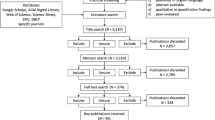Abstract
In this study a synthesis of research into student learning at the individual level is used to derive a general categorisation rule that can be applied to individual study orchestrations. The term ‘orchestration’ is introduced in this study to indicate that the association of constructs that represent approaches to studying at an individual level is a context-specific response and is affected by the qualitative level of perception of the individual towards certain key elements of learning context. In the first part of this study the association between context-dependent study orchestrations and learning outcome, and between ‘deep’ perceptions of learning context and learning outcome, is established. In the second part of this study the general categorisation rule is empirically validated by means of an unfolding analysis that sets out to illuminate the variability of individual study orchestrations as well as the group study orchestrations of academic achievers and failures.
It is concluded that learning outcome is associated with categorisations of individual study orchestrations/contextual perceptions. Furthermore, based on an unfolding analysis of academic achievers and failures, it is concluded that academic success is associated with a well defined meaning orchestration coupled with a holistic perception of learning context, while academic failure is associated with the disintegration of such an orchestration/perception.
Similar content being viewed by others
References
Dixon, W. J. (ed.) (1983). BMDP Statistical Software. University of California, Los Angeles.
Entwistle, N.J. (1987). ‘A model of the teaching-learning process’, in Richardson, J.T.E., Eysenck, M. W. & Warren Piper, D. (eds.), Student Learning. SRHE and OUP, Milton Keynes: pp. 13–29.
Entwistle, N. J. (1988). ‘Motivational factors in students approaches to learning’, in Schmeck, R. R. (ed.), Learning Strategie and Learning Styles. Plenum Press, New York.
Entwistle, N.J. (1989). ‘Approaches to studying and course perceptions: the case of the disappearing Relationship’, Studies in Higher Education 14(2): 155–156.
Entwistle, N. J. & Koz'eki, B. (1985). ‘Relationships between school motivation, approaches to studying and attainment, among British and Hungarian adolescents’, British Journal of Educational Psychology 55: 124–137.
Entwistle, N.J. & Marton, F. (1984). ‘Changing conceptions of learning and research’, in Marton, F., Hounsell, D. & Entwistle, N. (eds.), The Experience of Learning. Scottish Academic Press, Edinburgh: pp. 211–236.
Entwistle, N. J. & Ramsden, P. (1983). Understanding Student Learning. Croom Helm, London.
Entwistle, N. J. & Tait, H. (1990). ‘Approaches to learning, evaluations of teaching, and preferences for contrasting academic environments’, Higher Education 19(2): 169–194.
Goodman, L. A. & Kruskal, W. H. (1979). Measures of Association for Cross Classifications. Springer-Verlag, New York.
Marton, F. (1986). ‘Phenomenography - A research approach to investigating different understandings of reality’, Journal of Thought 21 (3): 28–49.
Marton, F. & Säljö, R. (1976a). ‘On qualitative differences in learning: I - Outcome and process’, British Journal of Educational Psychology 46: 4–11.
Marton, F. & Säljö, R. (1976b). ‘On qualitative differences in learning: II - Outcome as a function of the learner's conception of the task’, British Journal of Educational Psychology 46: 115–127.
Meyer, J. H. F. (1988a). ‘Student perceptions of learning context and approaches to studying’, South African Journal of Higher Education 2: 73–82.
Meyer, J. H. F. (1988b). ‘Qualitative differences in students' perceptions of learning environments’, in Kapp, C. A. (ed.), (1988). The Development of Learning and Thinking Skills in Students: Implications for Instructional Development. Bureau for University and Continuing Education, University of Stellenbosch.
Meyer, J. H. F. & Muller, M. W. (1990a). ‘An unfolding analysis of the association between perceptions of learning context and approaches to studying’, South African Journal of Higher Education 4:46–58.
eyer, J. H. F. & Muller, M. W. (1990b). ‘Evaluating the quality of student learning. I - An unfolding analysis of the association between perceptions of learning context and approaches to studying at an individual level’, Studies in Higher Education, 15 (2), in press.
Meyer, J. H. F. & Parsons, P. (1989a). ‘An empirical study of English and Afrikaans speaking students approaches to studying’, South African Journal of Higher Education 3 (2): 109–114.
Meyer, J. H. F. & Parsons, P. (1989b). ‘Approaches to studying and course perceptions using the Lancaster inventory - a comparative study’, Studies in Higher Education 14 (2): 137–153.
Miller, C. M. L. & Parlett, M. (1974). Up to the Mark: A Study of the Examination Game. S.R.H.E., Guildford.
Pask, G. (1976). ‘Styles and strategies of learning’, British Journal of Educational Psychology 46: 128–148.
Ramsden, P. (1985). ‘Student learning research: retrospect and prospect’, Higher Education Research and Development 4: 51–69.
Ramsden, P. (1989). ‘Perceptions of courses and approaches to studying: an encounter between Paradigms’, Studies in Higher Education 14 (2): 157–158.
Ramsden, P., Martin, E. & Bowden, J. A. (1989). ‘School environment and sixth form pupils approaches to learning’, British Journal of Educational Psychology 59: 129–142.
Sparks, R. S. (1988). ‘An analysis of an assessed written examination’, South African Journal of Higher Education 2 (2): 78–93.
Thomas, P. R. & Bain, J. D. (1984). ‘Contextual dependence of learning approaches: the effects of Assessments’, Human Learning 3: 227–240.
van Overwalle, F., Segebarth, K. & Goldchstein, M. (1989). ‘Improving performance of freshmen through attributional testimonies from fellow students’, British Journal of Educational Psychology 59: 75–85.
Watkins, D. (1982). ‘Identifying the study process dimensions of Australian university students’, The Australian Journal of Education 26 (1): 76–85.
Watkins, D. (1983). ‘Assessing tertiary study processes’, Human Learning 2: 29–37.
Watkins, D. (1984). ‘Student learning processes: an exploratory study in the Philippines’, Human Learning 3: 33–42.
Watkins, D. (1986). ‘The approaches to learning of Australian tertiary students: a replication’, Higher Education Research and Development 5 (2): 185–190.
Watkins, D. & Hattie, J. (1985). ‘A longitudinal study of the approaches to learning of Australian tertiary students’, Human Learning 4: 127–141.
Author information
Authors and Affiliations
Rights and permissions
About this article
Cite this article
Meyer, J.H.F., Parsons, P. & Dunne, T.T. Individual study orchestrations and their association with learning outcome. High Educ 20, 67–89 (1990). https://doi.org/10.1007/BF00162205
Issue Date:
DOI: https://doi.org/10.1007/BF00162205




